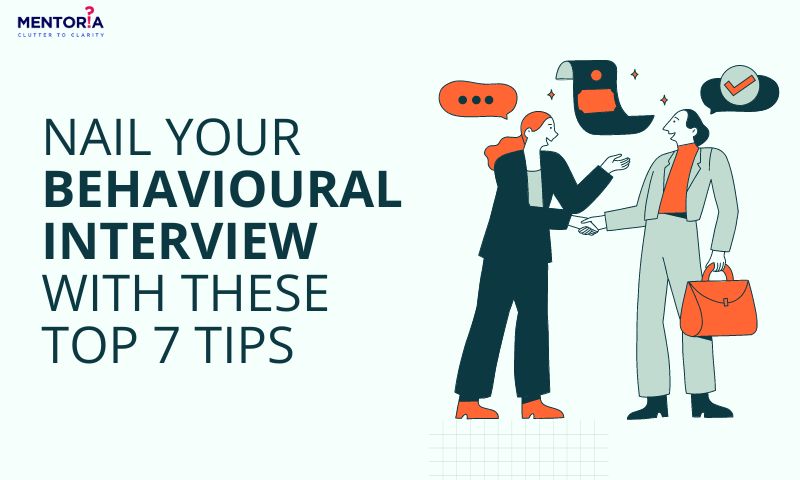Nail Your Behavioural Interview With These Top 7 Tips

Behavioural interviews can feel like a labyrinth, where those questions can either get you to your dream job or let you fall into a dead end. They aim to find out how you’ve sorted out various kinds of work experiences in the past and give the employer the opportunity to get a glimpse of your future performance. Employment interviews are completely different from traditional interviews where you are assessed by your skills and qualifications. Behavioural interviews dig deeper into your real-world experiences and problem-solving abilities.
Let’s say you’re across from a hiring manager and they say, “Can you tell me about a time when you had to deal with a difficult team member?” Your heart is pounding as you either lose your train of thought or get caught up in a less-than-impressive story. You can relate, right? But don’t worry, for it is possible with the right preparation and strategies to convert these questions into opportunities to demonstrate your strengths and achievements. In this blog, we’re going to walk you through seven top tips to help you ace your behavioural interview.
Understand The STAR Method
The STAR method is your secret weapon for behavioural interviews. The STAR approach means Scenario, Task, Action, and Result. A structured format is used to respond to questions by enumerating a specific situation, the task you were given, the action you took and the result your action had. This method helps you keep your answers clear and concise while showcasing your problem-solving skills.
- Situation: Provide the background information for a given task or a challenge you had to perform or meet at work.
- Task: Break down the task or the challenge that you faced. What was the requirement?
- Action: Disclose the action steps you followed to resolve the challenge or the problem. Provide reasons for your success.
- Result: Summarise how the things turned out as the result of your activities. What have you succeeded in? How did your sacrifices benefit your co-workers or group?
According to a 2023 survey, 76% of hiring managers found STAR method responses to be the most effective in behavioural interviews.
Research The Company And Role
You wouldn’t walk into a test without studying, right? The same goes for interviews. Learn more about the company and get to know the role you are applying for. Understand the company’s mission, values, and culture. This will help you tailor your responses to align with what they’re looking for.
Company Research Tips:
- Look at the ‘About Us’ section of the company’s section.
- Read through the latest news articles about the company.
- Follow the company on social media to get a feel for their culture.
Role Research Tips:
- Scrutinise the job description.
- Note common skills and experiences required for similar positions.
- Visit LinkedIn to see profiles of present workers in comparable roles.
Practice Common Behavioural Questions
Preparation is key. While you can’t predict every question, you can prepare for common behavioural questions. By practising these over and over again, you will be able to develop strong answers and ease your anxiety during an interview.
Common Behavioural Questions:
- “Tell me about a time you faced a significant challenge at work and how you handled it.”
- “Describe a situation where you had to work under pressure. How did you manage it?”
- “Give an example of a goal you set and how you achieved it.”
- Exercise your responses with the use of STAR technique.. Speaking out loud while practising can help calm your nerves during the actual interview.
According to Glassdoor’s 2023 Hiring Statistics, candidates who prepare and practise for common interview questions are 35% more likely to perform well during the interview.
Highlight Relevant Experiences
Focus on sharing past experiences that are directly related to the current job you’re applying for. Make your answers in such a way that it showcases how your past roles have prepared you for this new opportunity.
Tips for Highlighting Relevant Experiences:
- Match past responsibilities in jobs to the requirements of the new post.
- Highlight skills and accomplishments that are most pertinent to the job.
- Use specific cases that show how you could handle comparable assignments or obstacles.
A McKinsey State of Organisations 2023 study found that candidates who highlighted relevant experiences had a higher success rate in behavioural interviews compared to those who did not.
Be Honest And Authentic
Honesty is the best policy, especially in interviews. During interviews, it is essential to be honest because people can easily detect when somebody lies. Authenticity breeds trust and makes it easier for one to connect better with the interviewer.
Tips for Being Honest and Authentic:
- Share true stories even if they involve difficulties or failures.
- Be open about your strong points as well as areas you need to improve on.
- Let your personality shine through.
Ask Thoughtful Questions
Interviews are a two-way street. Asking thoughtful questions shows that you are genuinely enthusiastic about the job you are being interviewed for. Moreover, it offers good insights as to whether this would be the right kind of job for you.
Examples of Thoughtful Questions:
- “Can you give me some information about the people I will work with?”
- “What are the biggest challenges currently facing the department?”
- “How is success defined in this role?”
A 2023 study by the National Association of Colleges and Employers found that candidates who asked insightful questions during interviews were 50% more likely to be remembered positively by interviewers.
Follow Up With A Thank You Note
A small thanks can go a long way. Show your appreciation by sending a thank you note after the interview. This simple gesture can have a large impact.
Tips for a Great Thank-You Note:
- Send it within 24 hours of the interview.
- Personalise the note by mentioning something specific discussed during the interview.
- Express your interest in the role and why you are perfect for it.
According to a 2023 survey by Robert Half, 80% of hiring managers said that thank-you notes influenced their final hiring decision.
Rock Your Behavioural Interview
These seven tips should help you handle your behavioural interview with confidence and poise. Remember, preparation, authenticity, and connection are everything. And if you want to take your preparation to the next level, Mentoria is here to help.
Mentoria can provide you with the assistance you need to ace your behavioural interviews. Our expert coaches offer tailored advice, mock interviews, and feedback to boost your confidence and sharpen your skills. With Mentoria, you’ll walk into your interview ready to impress and secure that dream job. Let’s ace it together!










